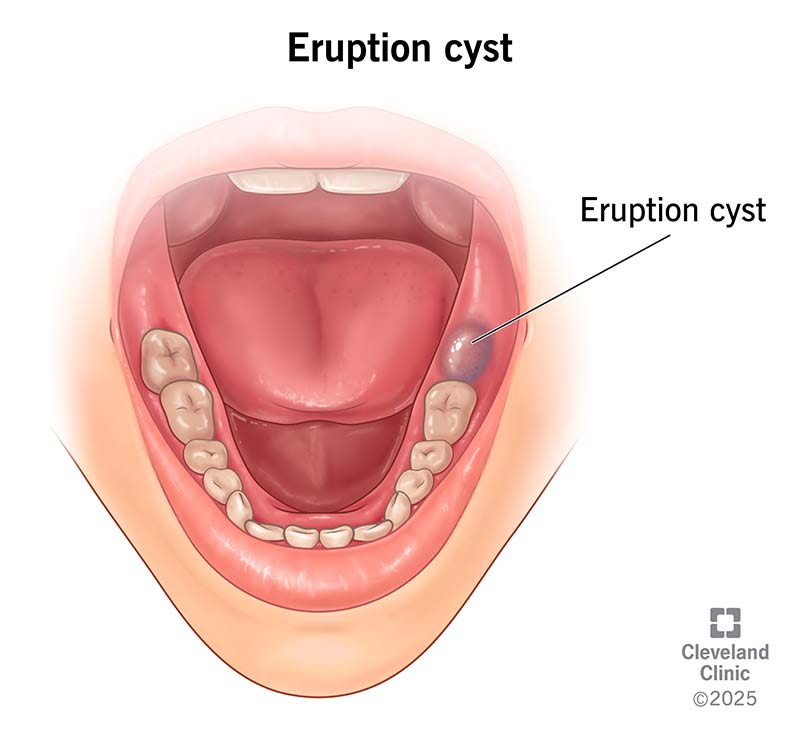Eruption cysts — also known as eruption hematomas — are a dental condition often seen in children. These fluid-filled lumps appear on the gums right before a new tooth comes in. Despite their unusual appearance, eruption cysts usually go away on their own. But if you have pain or other bothersome symptoms, treatment may be necessary.
Advertisement
Cleveland Clinic is a non-profit academic medical center. Advertising on our site helps support our mission. We do not endorse non-Cleveland Clinic products or services. Policy

Image content: This image is available to view online.
View image online (https://my.clevelandclinic.org/-/scassets/Images/org/health/articles/eruption-cyst)
An eruption cyst is a discolored, fluid-filled lump that can show up on your gums just before a new tooth comes in. While it may look unusual, it’s not harmful. In fact, it’s pretty normal.
Advertisement
Cleveland Clinic is a non-profit academic medical center. Advertising on our site helps support our mission. We do not endorse non-Cleveland Clinic products or services. Policy
Eruption cysts are most common during childhood when baby teeth fall out and make room for permanent adult teeth. But eruption cysts are possible at any age. Babies can get them before their first teeth grow in. Adults can get them, too, though it’s rare.
The good news is that eruption cysts usually don’t require treatment. They tend to go away on their own. But if you or your child develops symptoms like pain or infection, a simple procedure may help.
An eruption cyst looks like a bluish or clear bump on your child’s gums. It appears in an area where a new tooth is about to come in. Eruption cysts are most common toward the back of your child’s lower jaw.
They’re often painless. The bump may be the only sign.
An eruption cyst forms when fluid gets trapped between an emerging tooth and its protective sac (called the dental follicle). Experts aren’t sure why it happens, but they think it could have something to do with minor trauma or inflammation during tooth development.
Most go away on their own. But sometimes, they can cause complications, like:
If an eruption cyst lasts longer than two weeks, it’s best to tell your dentist.
A healthcare provider can spot an eruption cyst during a visual exam. They might take an X-ray to make sure the tooth under the gums looks OK. X-rays can also help them rule out infection.
Advertisement
Eruption cysts usually don’t require treatment. But if your child has one that won’t go away, a dentist might make a small incision (cut) in the area. They may also remove excess tissue to help coax the new tooth to come in.
Most of the time, treating eruption cysts involves a “wait and see” approach. Your child’s dentist may check in every couple of weeks until their new tooth emerges.
Tell your healthcare provider if an eruption cyst:
While an eruption cyst can look a bit unusual, it’s typically not harmful. If you think your child has one, it’s a good idea to tell their dentist. They may want to check in periodically to make sure the cyst doesn’t cause infection or other issues.
When your child’s new tooth starts its final journey through the gums, the eruption cyst will naturally pop (rupture). As the tooth grows in, the tissue around it will heal.
If your child has an eruption cyst that lasts longer than a month, your dentist may recommend minor surgery. This can help drain the cyst and encourage the new tooth to emerge.
Words like “lump” and “cyst” can sound alarm bells. But eruption cysts are a common part of tooth development. They’re not harmful unless they get infected or cause pain. Chances are, you can let nature run its course. But be sure to tell your healthcare provider if you or your child has a lump that won’t go away. A quick procedure can help.
Advertisement

Sign up for our Health Essentials emails for expert guidance on nutrition, fitness, sleep, skin care and more.
Learn more about the Health Library and our editorial process.
Cleveland Clinic’s health articles are based on evidence-backed information and review by medical professionals to ensure accuracy, reliability and up-to-date clinical standards.
Cleveland Clinic’s health articles are based on evidence-backed information and review by medical professionals to ensure accuracy, reliability and up-to-date clinical standards.
Dentistry plays an important role in oral health. Cleveland Clinic’s experts can design a personalized plan that will keep you smiling for the long haul.
